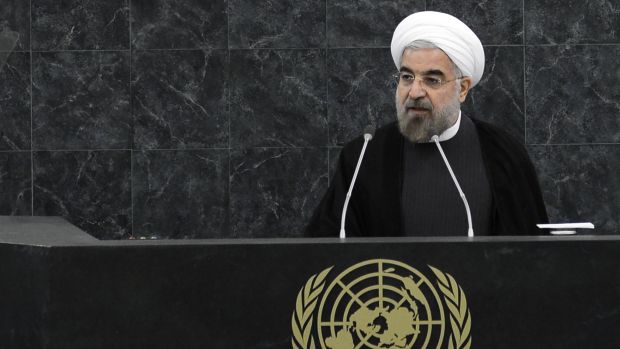During last week’s UN General Assembly meeting, attention was focused on whether President Hassan Rouhani of Iran and President Barack Obama of the US were going to meet and shake hands. That did not happen.
During Obama’s speech at the UN, Javad Zarif, Iran’s foreign minister, and Mohammad Khazaei, permanent representative of Iran to the UN, were both present. In contrast, during Rouhani’s speech, John Kerry, the US secretary of state, and also Samantha Power, the US permanent representative to the UN, were absent.
America sees itself as the center of the world. When everyone was talking about Obama and Rouhani’s potential handshake, the Iranian president told CNN said that more time was required to prepare for that meeting. Nevertheless, it seems the ice is now broken between the two countries. It is obvious that the wall of mistrust has started to crack and the lack of confidence between Iran and America is changing for the better.
Obama said that the US does not want to change the regime in Iran. In my opinion, this statement was the main point of his speech. I believe we are witnessing a new chapter in the Iran-US relationship. For the first time since the 1979 revolution, the Iranian foreign minister and the US Secretary of State met face to face, during the 5+1 session in New York on September 26. Both were smiling after the session, stated that it was positive and constructive, and that it marked the beginning of a new chapter between the two countries.
The speech at the UN General Assembly by Rouhani put forward a new idea. Rouhani’s initiative, The World Against Violence and Extremism (WAVE), should be commended. More than ever before, we, as Muslims, need to loudly announce that we are against violence and extremism. We, as Muslims, are the victims of violence and extremism across the world, and ironically, it is the Muslims who are often named and shamed as the source of violence and extremism. Rouhani’s suggestion should be seriously taken into consideration by Islamic countries, and especially by thinkers, writers, artists and the elites.
In the last paragraph of his speech in the UN, Rouhani focused on this crucial issue:
“Today, the Islamic Republic of Iran invites you and the entire world community to take a step forward; an invitation to join the WAVE: World Against Violence and Extremism. We should accept and be able to open a new horizon in which peace will prevail over war, tolerance over violence, progress over bloodletting, justice over discrimination, prosperity over poverty, and freedom over despotism. As beautifully said by Ferdowsi, the renowned Iranian epic poet:
Be relentless in striving for the cause of good
Bring the spring, you must, banish the winter, you should.”
Rouhani’s initiative has the potential to help create a new atmosphere in the world. As we know, when ex-President Mohammad Khatami proposed a Dialogue among Civilisations and Cultures, the response was simply outstanding. Khatami’s initiative can be read as a response to Samuel Huntington’s “Clash of Civilizations” theory. After Khatami introduced the concept in several international forums, most importantly in the United Nations, it gained plenty of international support.
Consequently, the UN proclaimed the year 2001 as the United Nations’ Year of Dialogue Among Civilizations, as per Khatami’s suggestion. Pleading for the moralization of politics, Khatami argued “the political translation of dialogue among civilizations would consist in arguing that culture, morality, and art must prevail on politics”.
Nowadays, we are indeed facing unprecedented violence and extremism in the world. For instance, think about what happened in Nairobi, with a four-day siege of terrorists in Nairobi’s Westgate shopping center. President Uhuru Kenyatta said 72 people had died, including six security personnel and five militants. Al-Shaba’ab, which claimed responsibility for the attack, said 137 hostages had died, although the statement cannot be verified.
The philosopher Descartes famously said “I think, therefore I am.” Now we are facing a new discourse, “I kill, therefore I am.” Look at Al-Shaba’ab, whose discourse about the murdering of people reads as though they are discussing the slaughtering of animals. This is the worst phenomenon, not only they justify their deeds, but also they think they are carrying out a sacred responsibility before God and the Prophet.
One of my friends told me that a young man was arrested because he was trying to make set off an explosion in Imam Ali’s dome in Najaf. The young man, who was perhaps less than twenty years old, began to cry loudly, saying that in two minutes time he was going to see our prophet in Paradise and that the Prophet was waiting for him. This is a strange trend in the Islamic world. How can we deal with this and amend these ideas?
First and foremost, we need to establish a strong movement against violence and extremism. I think Islamic conferences can play a major role these days. Rouhani’s initiative was the first step, but we need to play our part by supporting what he proposed. More than ever before, we need to be against violence and extremism in any form.
